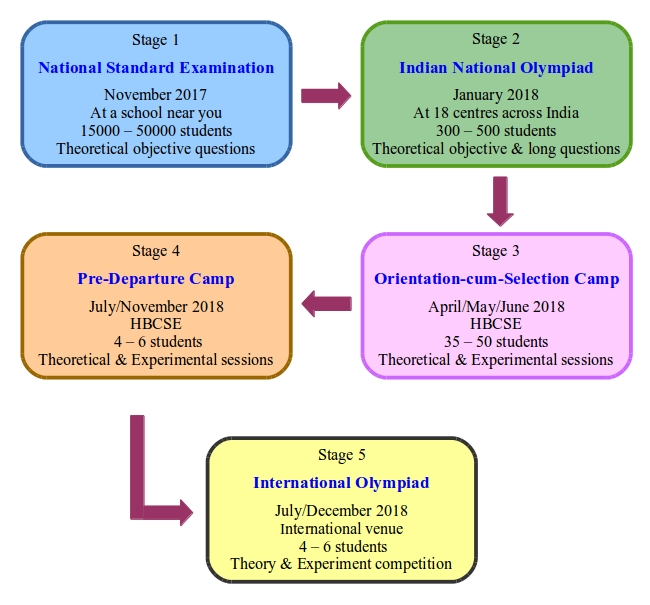National Standard Examination At 12th level -
Stages of Science Olympiad
The National Science Olympiad starts with an examination held at nearly 1400 schools across the country and culminates with the international Olympiads at different corners of the world. The national level examinations are designed to assess the conceptual understanding, logical reasoning, laboratory skills, and above all, ability to apply problem-solving skills to novel situations, both theoretical and experimental. Training is included from the third stage of the programme and the first two stages do not necessarily require any specialised coaching outside the regular school system.

Stage 1:
Stage 2:
The best-performing students from the NSEs (approximately 300 in each subject) qualify for the second stage — the Indian National Olympiads (INOs). The responsibility of the programme from this stage onwards lies with HBCSE. The INOs are held in late January at around 18 centres across the country. The syllabus is same as that of the NSEs. The tests consist of objective as well as long questions.
Stage 3:
Stage 4:
Stage 5:
The Olympiad programme culminates with the participation of the Indian students (4-6 in each subject) in the International Olympiads. The students are accompanied by 2-4 teachers or mentors. Almost every Indian student who has participated in the Science and Astronomy Olympiads has returned with a medal. For details of the performance click here.
National Standard Examination in Physics (NSEP), conducted every year since 1987, has become the most 'visible' activity of IAPT. It is a voluntary examination. More than 40,000 students at over 1200 centres, most of which are in small towns and villages, appear at this examination. The participation, purely voluntary, offers an opportunity to measure one's standing against a national standard. NSEP is not linked to any entrance or scholarship award. Students are allowed to take away the question paper and the solutions are provided to them after a week. The NSEP is carried out in English, Hindi & a few other Indian languages.
Recognition:
Gold medalists in NSEP, after they complete their education, may join DAE directly through interview without appearing in their entrance test.
Scholarships:
A number of scholarships (subject to a maximum of 10) have been instituted to encourage students to take-up physics as a career. Those who seek admission in B.Sc. (with physics) after NSEP are eligible for these scholarships.
Time schedule for 2016-17 Examinations:
Examination schedule:
|
Examination |
Date of Exam |
Time |
|
NSEJS |
20th November 2016 |
10:00 am to 12:00 noon |
|
NSEJS will be held one week before other NSEs and only in Kendriya Vidyalas. Students can still enrol in your school itself |
||
|
NSEP |
27th November 2016 |
08: 30 am to 10: 30 am |
|
NSEC |
27th November 2016 |
11: 00 pm to 01: 00 pm |
| NSEB | 27th November 2016 | 01:30 pm to 3: 30 pm |
| NSEA | 27th November 2016 | 01:30 pm to 3: 30 pm |

